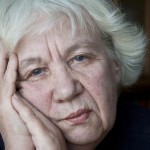
The hormone oestrogen could play an important role in late-life depression, according to new research published in the August issue of the British Journal of Psychiatry.
Oestrogen is best known as one of the significant hormones in reproduction. It is also believed to have a part to play in mood and mental health, because of the way that it acts on cells in the brain.
Researchers in France conducted a scientific study to investigate whether certain genetic variations, or ‘polymorphisms’, of oestrogen receptors were associated with severe depression in later life.
The team assessed 6,017 men and women over the age of 65, who were living in three French cities: Bordeaux, Dijon and Montpelier. Each person was interviewed to assess if they had a diagnosis of depression. Overall, 12.2% of women and 4.3% of men were diagnosed with current severe depression.
The team also took a blood sample from each person, which was analysed to determine their oestrogen receptor polymorphism type. Polymorphism type was ascertained using polymerase chain reaction (PCR), a technique which reveals details about DNA structure.
The study found that women with certain genetic variants of the oestrogen receptor, known as ER-a polymorphisms, were significantly more likely to have late-life depression. Some women with the ER-b rs1256049 polymorphism were also at increased risk of depression, but only those who were not currently using hormone replacement treatment.
The researchers found no strong associations between oestrogen receptor polymorphisms and depression risk in men.
The reasons for the association between some oestrogen receptor polymorphisms and depression are still unclear. However, oestrogen receptors can affect hundreds of genes, which in turn are involved in the production and breakdown of various chemicals in the brain which play a role in depression.
Lead researcher Dr Joanne Ryan said:
We found that polymorphisms of ER-a are associated with depression in older women. In addition, there is some evidence that taking hormone treatment can reduce the risk of depression in women with the ER-β rs1256049 polymorphism. Although more research is needed, our findings provide some preliminary evidence that hormone treatment could be beneficial for some women who are genetically vulnerable to severe late-life depression.
Ryan J, Scali J, Carrière I, Peres K, Rouaud O, Scarabin P-Y, Ritchie K and Ancelin M-L. Oestrogen receptor polymorphisms and late-life depression (PDF). British Journal of Psychiatry 2011; 199:126-131.

Hello, I read, with great interest, this article because for the past few years i feel hormones have played a significant role in cycles of deep depression i have suffered. I am 34 and have occasionally suffered with mood swings to do with my hormonal cycle in the past but nothing that has ever been debilitating enough to overrule my life. That is until the last three years whereby i go through phases of deep, prolonged depression (people close to me have noticed it and pointed it out and have also noticed it goes in fortnightly bouts). Usually i am a very logical, practical, understanding, loving and patient person but these qualities seem to go out the window somewhat when i go through these ’bouts’ of depression and often i don’t realise it until after and begin to wonder why on earth i would take things and react to things in such powerfully emotional ways that normally i wouldn’t.
I would be glad to be a part of tests (may be at regular intervals to see the fluctuations of hormones) to work out just what is happening and i would be so so grateful if i could get back to normality without these debilitating depressive bouts which sometimes leave me not even wanting to get up….at all on some days sometimes which is just ridiculous and i want to snap out of it yet it often feels like a great huge dark cloud is weighing over me and i cannot release myself (at the moment i am in a lucid phase of logic and normality). If anyone can help me or i can be of any use in formally recognising this as a problem for some people then i will be happy to help.
Many thanks for your time and consideration.
Sincerely, Jane Goddard.
Hi, this is an interesting research. Could these oestrogen receptor mutations also explain why women are more likely to be depressed than men? At least I gather from your post that three times more older women were depressed than older men.